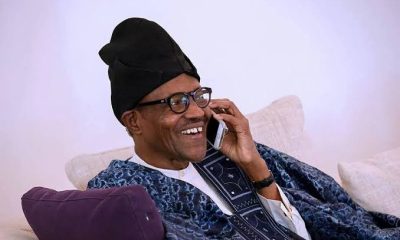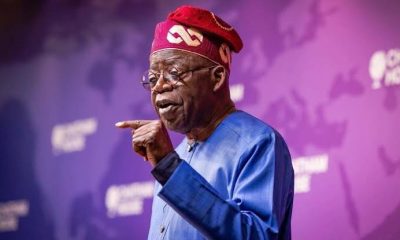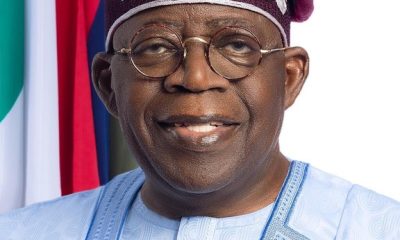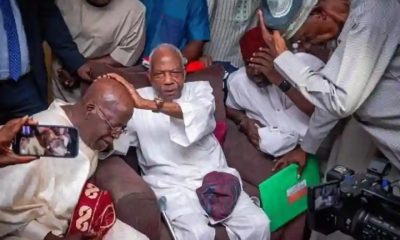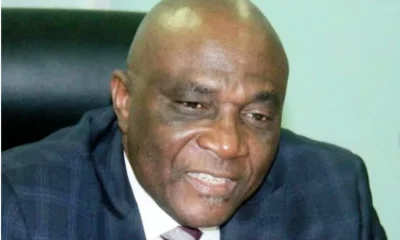Headline
Most Transparent Since 1999: Tinubu Rejects EU Report On 2023 Election
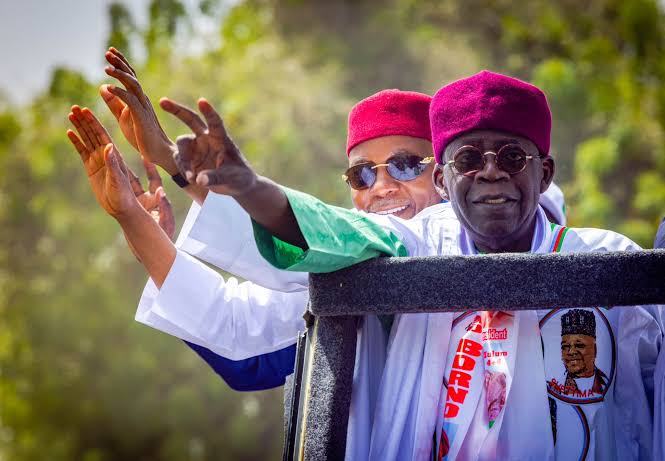
The Presidency filed a response to EU: 2023 Elections Lacked Transparency, Trust In INEC Severely Damaged
STATE HOUSE PRESS RELEASE
WE REJECT EUROPEAN UNION’S CONCLUSIONS ON 2023 GENERAL ELECTIONS
Sometimes in May, we alerted the nation, through a press statement, to the plan by a continental multi-lateral institution to discredit the 2023 general elections conducted by the Independent National Electoral Commission. The main target was the presidential election, clearly and fairly won by the then candidate of All Progressives Congress, Bola Ahmed Tinubu.
While we did not mention the name of the organisation in the said statement, we made it abundantly clear to Nigerians how this foreign institution had been unrelenting in its assault on the credibility of the electoral process, the sovereignty of our country and on our ability as a people to organise ourselves. We find it preposterous and unconscionable that in this day and age, any foreign organisation of whatever hue can continue to insist on its own yardstick and assessment as the only way to determine the credibility and transparency of our elections.
Now that the organisation has submitted what it claimed to be its final report on the elections, we can now categorically let Nigerians and the entire world know that we were not unaware of the machinations of the European Union to sustain its, largely, unfounded bias and claims on the election outcomes.
For emphasis, we want to reiterate that the 2023 general elections, most especially the presidential election, won by President Bola Tinubu/All Progressives Congress, were credible, peaceful, free, fair and the best organised general elections in Nigeria since 1999.
There is no substantial evidence provided by the European Union or any foreign and local organisation that is viable enough to impeach the integrity of the 2023 election outcomes.
It is worth restating that the limitation of EU final assessment and conclusions on our elections was made very bare in the text of the press conference addressed by the Head of its Electoral Observation Mission, Barry Andrews. While addressing journalists in Abuja on the so-called final report, Andrews noted that EU-EOM monitored the pre-election and post-election processes in Nigeria from January 11 to April 11, 2023 as an INEC accredited election monitoring group. Within this period, EU-EOM observed the elections through 11 Abuja-based analysts, and 40 election observers spread across 36 states and the Federal Capital Territory. With the level of personnel deployed, which was barely an average of one person per state, we wonder how EU-EOM independently monitored election in over 176,000 polling units across Nigeria.
We would like to know and even ask EU, how it reached the conclusions in the submitted final report with the very limited coverage of the elections by their observers who, without doubt, relied more on rumours, hearsay, cocktails of prejudiced and uninformed social media commentaries and opposition talking heads.
We are convinced that what EU-EOM called final report on our recent elections is a product of a poorly done desk job that relied heavily on few instances of skirmishes in less than 1000 polling units out of over 176,000 where Nigerians voted on election day.
We have many reasons to believe the jaundiced report, based on the views of fewer than 50 observers, was to merely sustain the same premature denunciatory stance contained in EU’s preliminary report released in March.
We strongly reject, in its entirety, any notion and idea from any organisation, group and individual remotely suggesting that the 2023 election was fraudulent.
Our earlier position that the technology-aided 2023 general elections were the most transparent and best organised elections since the return of civil rule in Nigeria has been validated by all non-partisan foreign and local observers such are the African Union, ECOWAS, Commonwealth Observer Mission and the Nigerian Bar Association.
Unlike EU-EOM that deployed fewer than 50 observers, the Nigerian Bar Association that sent out over 1000 observers spread across the entire country for same election gave a more holistic and accurate assessment of the elections in their own report.
NBA, an organisation of eminent lawyers and an important voice within the civic space, reported that 91.8 per cent of Nigerians rated the conduct of the national and state elections as credible and satisfactory. Any election that over 90% of the citizens considered transparent should be celebrated anywhere in the world.
It is heart-warming that INEC, through its National Commissioner for Information and Voter Education, Mr. Festus Okoye, has come out to defend the integrity of the election it conducted by rejecting the false narratives in the EU report.
It is also gratifying that the electoral umpire, as an institution that is open to learning and continuous improvements, has also committed to taking on board more ideas, innovation and reforms that will further enhance the integrity and credibility of our electoral process.
As a country, we have put the elections behind us. President Tinubu is facing the arduous task of nation-building, while those who have reasons to challenge the process continue to do so through the courts. In just one month in office, Nigerians appear satisfied with the decisive leadership of President Tinubu and the manner he is redirecting the country to the path of fiscal sustainability and socio-economic reforms. We urge the EU and other foreign interests to be objective in all their assessments of the internal affairs of our country and allow Nigeria to breathe.
Dele Alake
Special Adviser to the President
(Special Duties, Communications and Strategy)
July 2, 2023
Headline
Fagbemi warns against obstructing EFCC from performing its lawful duty

The Minister of Justice, Lateef Fagbemi, SAN has warned against obstructing the Economic and Financial Crimes Commission (EFCC) from carrying out its lawful duty .
Fagbemi’s warning is contained in a statement in Abuja.
“This is a matter of very grave concern, it is now beyond doubt that the EFCC is given power by the law to invite any person of interest to interact with them in the course of their investigations into any matter, regardless of status.
“Therefore, the least that we can all do when invited, is not to put any obstruction in the way of EFCC, but to honourably answer their invitation.
“A situation where public officials who are themselves subject of protection by law enforcement agents will set up a stratagem of obstruction to the civil and commendable efforts of the EFCC to perform its duty is to say the least, insufferably disquieting’’.
He added that running away from the law will not resolve issues at stake but only exacerbate them.
“Nigeria has a vibrant judicial system that is capable of protecting everyone who follows the rule of law in seeking protection.
“I therefore encourage anyone who has been invited by the EFCC or any other agency to immediately toe the path of decency and civility by honouring such invitation instead of embarking on a temporising self-help and escapism.
“This can only put our country in bad light before the rest of the world’’.
He said institutions of state should be allowed to function effectively and efficiently.
“I stand for the rule of law and will promptly call EFCC, and indeed any other agency to order when there is an indication of any transgressions of the fundamental rights of any Nigerian by any of the agencies’’.
NAN reports that the EFCC had on Wednesday warned members of the public that it was a criminal offence to obstruct officers of the Commission from carrying out their lawful duties.
Section 38(2)(a(b) of the EFCC Establishment Act makes it an offence to prevent officers of the Commission from carrying out their lawful duties. Culprits risk a jail term of not less than five years.
The warning , the EFCC said, became necessary against the background of the increasing tendency by persons and groups under investigation by the Commission to take the laws into their hands by recruiting thugs to obstruct lawful operations of the EFCC.
On several occasions, the anti graft agency said, operatives of the Commission have had to exercise utmost restraint in the face of such provocation to avoid a breakdown of law and order.
Headline
Unknown Gunmen Abduct Channelstv Reporter In Port-harcourt

Some unknown gunmen have kidnapped Joshua Rogers, the ChannelsTV reporter in Port-Harcourt, the Rivers State capital.
Politics Nigeria learnt that Rogers was picked up close to his residence at Rumuosi in Port Harcourt and to an unknown destination by the gunmen around 9pm on Thursday, April 11.
The reporter was driving his official ChannelsTV branded car when the hoodlums accosted, pointed a gun at him and took him away in the same vehicle.
Rogers was said to be returning from his official assignment in Government House after a trip to Andoni for a government event when the incident happened.
Already, the gunmen were said to have contacted his wife and demanded a N30million ransom for bis release.
His cameraman confirmed the incident and appealed to his abductors to set him free unconditionally.

